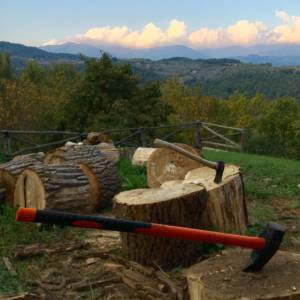Very short story
The temp has dropped by 17degrees since Saturday. Incredible and people seem so happy the heat is broken. It rained another 11mm. And we were cold. Cold!
I wrote a little story inspired by a saying in Vol 1 of Mantel, which I am rereading as I didn’t feel ready to let her go when I’d laboured to the end of vol 3. I was thinking of JM Coetzee and a v moving column from Fidelma Cooke in the Glasgow Herald about her years in la France profonde last weekend.
The Gateway
He’d moved to Italy, driving his wife and four children before him. A brother in the sect returned to Somerset had sold him the house and land sight unseen. Had made up all sorts of believable tales of the clear air, the abundant water, the removal from vice and sin, at an elevation where God’s very breath could be felt on a still night in June.
The reality was even more austere than his driest fantasies. A collapsing stone house rent by widening cracks, a track passable only by mule or sled and land angrily reclaimed by scrub forest and unbiddable wild boar. As for water there was none. The parched limestone hills offered nothing, no spring, no well, no stream, no torrent. Just a cistern beneath the house to catch the endless winter rain that finished when it was needed most.
But once made the move could not be gainsaid. Somewhere in his frenzied mind he knew that this was not God’s will. But it helped to think it so. It helped as he took on towering thickets of blackthorn and bramble. It helped when the boar smashed through the potato beds. It helped as the maize and wheat shrivelled and paled in the unrelenting heat.
The wife gave her all at first but left with the kids when a better offer eventually came her way. For this was, he thought, also God’s will. He fought on and found a way to a pitiful wage cutting firewood under skudding winter skies.
His determination to stay on his piece of God’s earth grew as did his thirst for the rough wine he’d haul up from the hamlet an hour’s walk away. In the echoing stony dark he’d belt out his ancient church hymns in a voice grown hoarse from disuse. At the farm a half mile below they’d swop looks: ‘Old John’ they’d say. ‘Che poveretto.’
Pride and faith held him immovable in place while all decayed around him. They found him dead and dried like a maize husk near the entrance to his domain, a bleached letter for the post still gripped tight in his hand.
As they carried him down on the one door standing in the house they stopped and turned. Into the hard hewn chestnut arch where a gate once stood he’d gouged out, ‘Whom the Lord loves he correcteth.’

Comments
Sign in or get an account to comment.


